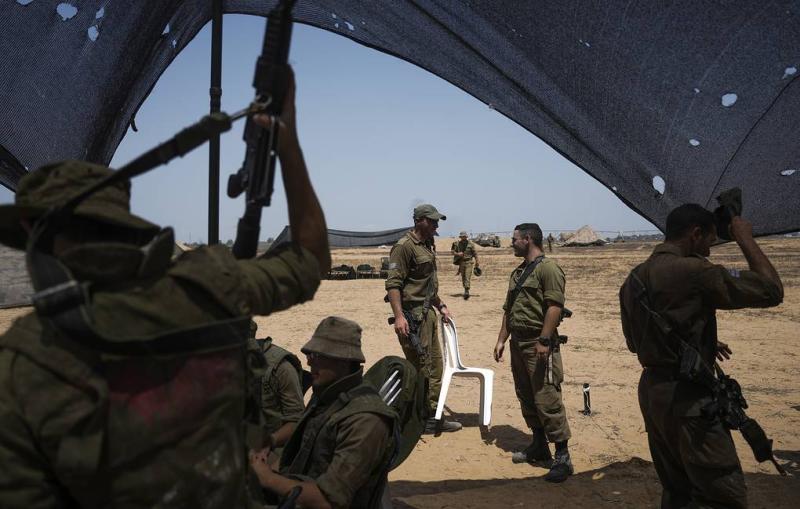
© AP Photo/Ariel Schalit/TASS
Top stories from the Russian press on Tuesday, August 9th, prepared by TASS
Vedomosti: Ukraine urges sanctions on Russia over its own attacks on nuclear plant
Kiev seems to have taken advantage of the August 5 and 7 attacks on the Zaporozhye Nuclear Power Plant, located in an area controlled by Russian troops, to call for another package of sanctions against Moscow. According to Western media reports, Ukrainian President Vladimir Zelensky had discussed the issue with European Council President Charles Michel, Vedomosti writes.
Ukraine has been demanding sanctions on Russia’s Rosatom State Nuclear Energy Corporation since late February, but to no avail so far because cutting ties with the Russian corporation would be painful for the European Union, AtomInfo.ru Editor-in-Chief Alexander Uvarov pointed out. Several nuclear power plants in Europe - two in the Czech Republic, one in Hungary, one in Bulgaria and another one in Finland - fully depend on Russian nuclear fuel supplies, the expert noted. In theory, they can turn to the US-based Westinghouse company but the Americans won’t be able to meet the needs of all of Rosatom’s European clients.
If the EU imposed sanctions on Rosatom over developments around the Zaporozhye NPP, it would be strange, to say the least because it’s not the Russian corporation’s actions that have created the current situation but Ukraine’s attacks, Russian International Affairs Council expert Ivan Timofeev emphasized. In his view, such a scenario is unlikely.
If Rosatom is cut off from normal transactions and faces a partial ban on equipment supplies, it will call the industry’s security into question, the expert warned. Such steps will pose highly improbable but specific risks that the EU will hardly be willing to take, he noted. However, targeted sanctions on senior managers at the Russian state corporation and government officials are possible, though it will be a symbolic measure, the expert concluded.
Izvestia: Ceasefire between Israel and Gaza remains at risk
A ceasefire between Israel and the Gaza Strip is still holding though the Palestinian Islamic Jihad militant group vowed its readiness to resume attacks if Israel failed to release Palestinian prisoners. The Israeli government, in turn, reiterated that it would not make any concessions. Experts interviewed by Izvestia believe that the truce is temporary since the main triggers are still there, with Israel refusing to build political dialogue with Palestine.
The easing of tensions in such situations depends on whether both parties are capable of saving their face, said Sergey Melkonyan from the Institute for Oriental Studies at the Russian Academy of Sciences. "In this case, Islamic Jihad claims that its political goal has been achieved because Israel is expected to release two of the group’s prisoners. Israel, in turn, is pointing to the damage caused to the group, with its commanders killed and hundreds of targets hit. Prime Minister Yair Lapid, who is far from security issues, managed to handle the crisis, while the group made a serious statement. Both parties emerged victorious in the eyes of their supporters," the expert explained.
At the same time, in his words, even if Israel fails to fulfill Islamic Jihad’s demands, it doesn’t mean that tensions will flare up the very next day. Islamic Jihad still needs time to recuperate, while it has sold its "victory" to a certain part of the population, Melkonyan stressed.
Meanwhile, Islamic Jihad remains under pressure, Israeli political analyst Zeev Hanin pointed out. The group will have to prove its importance for Iran and Palestinian Arabs, rivalling with Hamas.
Media: Southeastern Ukrainian region seeks to follow Crimea’s path
Head of southeastern Ukraine’s Zaporozhye regional administration Yevgeny Balitsky has signed a decree to hold a referendum on joining Russia. Meanwhile, Ukrainian President Vladimir Zelensky warns that if a plebiscite takes place, there will be no more negotiations with Moscow, Nezavisimaya Gazeta writes.
First Deputy Chairman of the Russian State Duma Committee on CIS Affairs Konstantin Zatulin points out, however, that no talks are currently underway. Given the challenging situation, organizers will have to take well-considered decisions on when and how to hold referendums, the lawmaker noted.
The regional administration’s decree outlines only preliminary preparations for a referendum, Executive Director of the Russian Social Institute for Electoral Rights Alexander Ignatov told Vedomosti. "If we recall how things unfolded in Crimea, a provision was adopted there, which was later greenlighted by representative bodies in Crimea and Sevastopol, and electoral commissions organized a referendum based on this document," Ignatov emphasized.
The electoral legislation that will be applied to the Zaporozhye Region’s referendum will partially be copied from the Russian one, lawyer Anton Rudakov noted. "They will partially use the methods that were tested at the Crimean referendum," the expert said. According to him, the details and timeframe of the upcoming vote have not been announced yet due to the ongoing military operation. "I think that neither specific dates nor conditions will be set and everything will remain at the level of declarations for the time being," Rudakov added.
Rossiyskaya Gazeta: Apple seeks to distance itself from China
Tech giant Apple is seeking to reduce its dependence on China as the main assembly country. Experts believe that this is one of the reasons why Apple has decided to launch the production of its newest iPhone 14 series simultaneously in India and China, Rossiyskaya Gazeta notes.
Taiwan’s Foxconn company, Apple’s key partner in terms of electronics manufacturing, has iPhone production facilities in several countries beyond China, particularly in Brazil, India, Turkey and the Czech Republic. However, producing devices for the global market has until recently been the domain of Foxconn’s Chinese sites.
It looks like the situation will change this year and the production of the iPhone 14 line-up will begin simultaneously in China and India, 9to5mac portal analyst Ming-Chi Kuo points out. According to him, at least one of the iPhone 14 models will be manufactured at a facility located in the suburbs of the Indian city of Chennai. If it really happens, it will be the first time ever that the production of Apple’s next-generation iPhones is launched in another country at the same time as in China. Mobile Research Group analyst Eldar Murtazin believes that "production sites in other countries such as Vietnam and India may well replace the Chinese ones."
As for exports to Russia, representative of India’s YAM Logistics company Razi Zaheer said that the expansion of Apple’s production would increase the Indian market’s export potential, making it possible to establish new supply chains, including to Russia through the parallel imports scheme.
Rossiyskaya Gazeta: One in five Russians ready to earn less just not to return to office
Russians have become addicted to working remotely. Telecommuting has just come to an end but many employees are already dreaming of its return and are even ready to see their wages go down just to have a chance to work from home, Rossiyskaya Gazeta writes.
A poll conducted by the SuperJob service has revealed that one in five Russians is ready to give up part of their wages just not to go to the office every single day. According to their estimates, the reduced income will be offset by a more convenient work schedule and nil spending on transport and eating out.
As the coronavirus pandemic situation tends to stabilize, employers return to usual work because it’s more difficult to effectively control staff out of the office. Apart from that, many types of work require group discussions. Telecommuting will remain part of work for certain categories of employees and a tool for reducing office maintenance costs. However, these are single cases, Professor at the Russian Government’s Financial University Alexander Safonov noted.
"Although the number of executives capable of managing scattered teams has grown compared to the pre-pandemic period, there are also many conventionalists who prefer in-office work," СROS Agency Director General Ekaterina Movsesyan pointed out. However, in her words, it is too early to announce a full victory over COVID-19 as serious outbreaks can be on the horizon this fall and restrictions may be reimposed on in-office work. This is why it’s not yet the time to say farewell to telecommuting.









